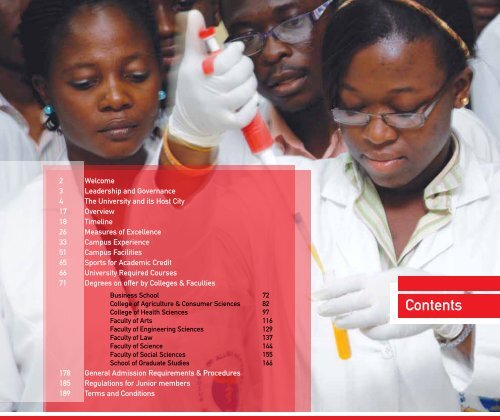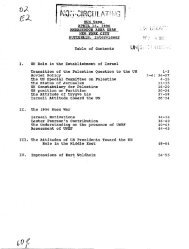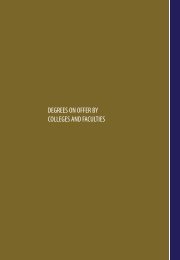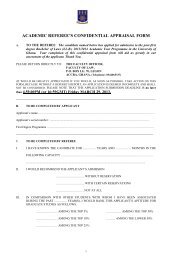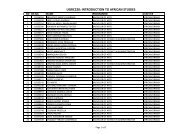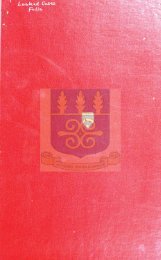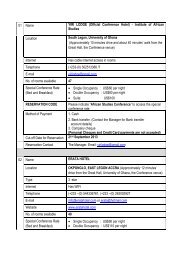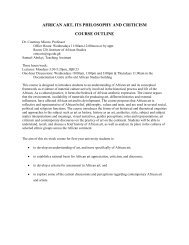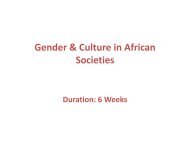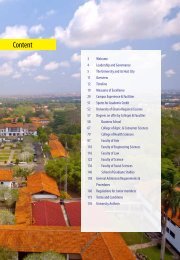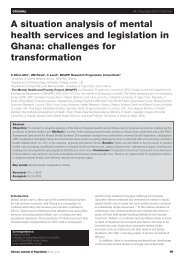Create successful ePaper yourself
Turn your PDF publications into a flip-book with our unique Google optimized e-Paper software.
2 Welcome3 Leadership and Governance4 The <strong>University</strong> and its Host City17 Overview18 Timeline26 Measures <strong>of</strong> Excellence33 Campus Experience51 Campus Facilities65 Sports for Academic Credit66 <strong>University</strong> Required Courses71 Degrees on <strong>of</strong>fer by Colleges & FacultiesBusiness School 72College <strong>of</strong> Agriculture & Consumer Sciences 82College <strong>of</strong> Health Sciences 97Faculty <strong>of</strong> Arts 116Faculty <strong>of</strong> Engineering Sciences 129Faculty <strong>of</strong> Law 137Faculty <strong>of</strong> Science 144Faculty <strong>of</strong> Social Sciences 155School <strong>of</strong> Graduate Studies 166178 General Admission Requirements & Procedures185 Regulations for Junior members189 Terms and ConditionsContents
Welcome,The development <strong>of</strong> world-class humanresources and capabilities is fundamentalto the progress <strong>of</strong> any community. Andquality teaching, learning, research and knowledgedissemination is absolutely fundamental to thechallenges that confront the global community.Today’s higher education demands that students beequipped with knowledge and competencies to findworkable solutions to ever-increasing local and globalchallenges.At the <strong>University</strong> <strong>of</strong> <strong>Ghana</strong>, we take a serious view<strong>of</strong> what it takes to nurture competencies becausemost <strong>of</strong> our students come from developing landswhere healthcare, basic education and food securitycontinue to limit the quality <strong>of</strong> life. Six decades <strong>of</strong>teaching and learning has reaffirmed our belief thata multidisciplinary approach to finding solutions isthe way to go. For this reason, our faculties work atthe forefront <strong>of</strong> academia, industry and governanceproviding the needed leadership in research,technology, policy and advocacy. For instance, lastyear saw some 1,070 publications and 1,300 researchprojects being conducted in collaboration with bothlocal and foreign partners.Given the enormous diversity <strong>of</strong> teaching and learningactivities at the <strong>University</strong>, this admission prospectusis just a glimpse <strong>of</strong> what we do here. Nevertheless, Ihope it will give you some insight into the way we canassist you nurture your intellectual capital. Regardless<strong>of</strong> your career ambitions, I encourage you to honeyour skills and competencies so you can assume theleadership roles necessary to shape the needs <strong>of</strong> yourcommunity, nation or continent.Sincerely,Pr<strong>of</strong>essor Ernest AryeeteyBA (Econ), MSc (Kumasi), PhD (Dortmund).Vice-Chancellorwww.ug.edu.gh 2
Leadership & GovernancePrincipal OfficersChancellorChairman, <strong>University</strong> CouncilVice-ChancellorHis Excellency, Mr. K<strong>of</strong>i Annan(Kumasi) DEA (UHEI) MSc (Massachusetts)Justice Samuel K<strong>of</strong>i Date-BaahLLB (<strong>Ghana</strong>) BL LLM (Yale), PhD (London)Pr<strong>of</strong>essor Ernest AryeeteyBA (Econ) MSc (Kumasi) PhD (Dortmund)Other OfficersPro Vice-Chancellor(Academic & Student Affairs)Pro Vice-Chancellor(Research, Innovation & Development)Registrar<strong>University</strong> LibrarianPr<strong>of</strong>essor E. K. OsamBA, MPhil(<strong>Ghana</strong>), PhD (Oregon)Pr<strong>of</strong>essor John GyapongBSc (Kumasi), MSc, PhD (London)Mr. Joseph Maafo BuduBA (<strong>Ghana</strong>) Dip Ed MA (London)Pr<strong>of</strong>essor Ellis BaduBA Grad Dip MA, MPA (<strong>Ghana</strong>)3 <strong>University</strong> <strong>of</strong> <strong>Ghana</strong>
The <strong>University</strong> and its Host CityUNIVERSITY CAMPUSESThe <strong>University</strong> <strong>of</strong> <strong>Ghana</strong> is a centre<strong>of</strong> academic excellence recognisedworldwide for the academic excellence<strong>of</strong> its faculty and student body andfor the pr<strong>of</strong>essional success <strong>of</strong> itsalumni. The <strong>University</strong>’s distinctive,specialised teaching and impactfulresearch is carried across three campuscommunities – Legon Campus, AccraCity Campus and Korle Bu Campus.Legon CampusLocated 13 kilometers northeast <strong>of</strong> Accra,Legon is recognised as the nerve-centre <strong>of</strong><strong>Ghana</strong>’s premier academic resource. LegonCampus houses the central administrationand the five traditional Halls <strong>of</strong> the<strong>University</strong> - Legon, Volta, Commonwealth,Akuafo and Mensah Sarbah. Many <strong>of</strong> theacademic, residence and support servicefacilities which were commissioned inthe 1960s and 1970s have undergonerenovation and expansion. Recent projectsinclude VALCO Trust Hostel (1997) JubileeHall (1998), International Students Hostel(1999), Hilla Limann, Alexander AdumKwapong, Jean Nelson Aka Halls (2010) andElizabeth B. Sey Hall (2012).What’s in a Word?LegonLegon comes from two indigenousGa words: “ni-le” which is translated“knowledge” and “gon” which is translatedas “hill”; thus Legon is the rendering <strong>of</strong>“nile-gon” - “hill <strong>of</strong> knowledge”; aptlydescribing the 121 metre altitude <strong>of</strong> theLegon Campus.www.ug.edu.gh 4
Korlebu CampusThe Korle Bu Campus is located 3kilometres from Accra’s Central BusinessDistrict. The Korle Bu Campus houses theCollege <strong>of</strong> Health Sciences comprising theMedical School, Dental School, School <strong>of</strong>Public Health, Noguchi Memorial Institutefor Medical Research, the School <strong>of</strong> AlliedHealth Sciences, the School <strong>of</strong> Nursing andthe School <strong>of</strong> Pharmacy. Affiliated with theCollege <strong>of</strong> Health Sciences is the Korle BuTeaching Hospital, the largest teachinghospital in <strong>Ghana</strong>. The stimulating academicexperience at Korle Bu Campus is furtherenriched by three centres <strong>of</strong> excellence:the National Cardiothoracic Centre, theNational Plastic and Reconstructive SurgeryCentre and the Radiotherapy Centre.5 <strong>University</strong> <strong>of</strong> <strong>Ghana</strong>
Accra City CampusThe Accra City Campus was originallyestablished during the 1963/1964 AcademicSession as the External Degree Centre.Until it was restructured into the Accra CityCampus in 2002, it was known as the AccraWorkers College. The City Campus <strong>of</strong>fersmature persons and persons who prefernot to study full time with access to many<strong>of</strong> the degree programmes available on themain Legon Campus. It is located within theCentral Business District <strong>of</strong> Accra.www.ug.edu.gh 6
AccraIn 1877, Accra became the capital <strong>of</strong> the then Britishcolony <strong>of</strong> Gold Coast and has served as <strong>Ghana</strong>’scapital after independence in 1957. Accra’s influencein Pan-Africanism, African Politics, Education andthe Arts contributes to <strong>Ghana</strong>’s status as a bastion <strong>of</strong>good governance and democracy in Africa.Accra is the capital <strong>of</strong> <strong>Ghana</strong> and it is Located at 5°30’ North,0°10’ West <strong>of</strong> the West African Country. Its architectural landscapeis a delicate balance <strong>of</strong> ancient with modernity and African withEuropean. Originally settled by the Ga people in the 15th century,Accra became a strategic trade post, first in gold and later in slavetrade. For some 250 years, the Portuguese, Dutch, British, Danishand Germans competed in the slave trade exporting about 10,000slaves annually.7 <strong>University</strong> <strong>of</strong> <strong>Ghana</strong>
Accra By NightWith some effort, if you manage toclimb the Legon hill on which theadministrative seat <strong>of</strong> the university islocated on campus, you would have apleasant valley view <strong>of</strong> the surroundingcommunities on the borders <strong>of</strong> theuniversity and beyond. Eventhoughsome Commonwealth Hall memberswould like to claim the credit, itsunclear as to who named it but it hascome to be known and accepted as‘Accra by night’ by both past andpresent students. They would easilypoint to this location as one <strong>of</strong> theirfavourite spots on campus.But if you happen to be a bit <strong>of</strong> anextreme sight seeker, then by allmeans embark on the energy taskingquest <strong>of</strong> climbing the university tower.And when you finally get to the top <strong>of</strong>the `black star’ tower, you might justignore the fact that your heart beat isin overdrive. Because not only wouldyou be rewarded with a breath takingview <strong>of</strong> almost the whole <strong>of</strong> Accra,you would also enjoy a clean and arefreshing tropical breeze. And yourheart is bound to be compensated forits hard work.<strong>University</strong> <strong>of</strong> <strong>Ghana</strong> 8
The People & Culture9 <strong>University</strong> <strong>of</strong> <strong>Ghana</strong>
Places <strong>of</strong> InterestMuch <strong>of</strong> the attractions <strong>of</strong> Accra arebased on its historical and cultural legacy.Each corner <strong>of</strong> the old part <strong>of</strong> the city isa distinguished element <strong>of</strong> the Europeanpresence and the struggle towardspolitical independence. However, Accraalso posses many cultural, ecological andcommercial attractions worth exploring.The National TheatreInaugurated in 1992, the architecture <strong>of</strong>the National Theatre is akin to a grandioseship with open sails. It houses the NationalSymphony Orchestra playing local traditionalinstruments, National Dance and NationalDrama Companies. The contemporary design<strong>of</strong> the theatre includes a Chinese-stylegarden, an open air theatre and an exhibitionhall where important corporate and socialevents are <strong>of</strong>ten held.11 <strong>University</strong> <strong>of</strong> <strong>Ghana</strong>
Kwame Nkrumah Memorial Park (KNMP)The Kwame Nkrumah Memorial Park houses the mausoleum<strong>of</strong> Osagyefo Dr. Kwame Nkrumah, the first President <strong>of</strong> <strong>Ghana</strong>and a famous Pan-Africanist. The Park which used to be calledPolo Grounds also consists <strong>of</strong> a statue and a museum <strong>of</strong> the lifeand work <strong>of</strong> Dr. Kwame Nkrumah. It was on this same spot thatDr. Kwame Nkrumah declared independence for <strong>Ghana</strong> on 6thMarch 1957.National MuseumThe National Museum houses a fascinating collection <strong>of</strong>historical treasures <strong>of</strong> <strong>Ghana</strong> and neighbouring West Africancountries. It includes objects <strong>of</strong> archeology, ethnography andfine art. The ethnography collection includes traditional chiefsregalia, indigenous <strong>Ghana</strong>ian musical instruments, gold-weights,beads, traditional textiles, stools and pottery. The archeologicalsection houses objects dating from the Stone Age to recenttimes.George Padmore Research Library on African AffairsNamed after George Padmore (1902-1959), this library,research and educational centre houses materials relating to theblack community <strong>of</strong> Caribbean, African and Asian descent inBritain and continental Europe. George Padmore, a Trinidadianwriter and a dedicated Pan-Africanist, was one <strong>of</strong> the influentialfigures <strong>of</strong> the anti-colonialism and independence struggles <strong>of</strong>the 20th Century.The Independence SquareThe Independence Square is built on the original site wherethree service men were shot during the colonial times, whilesattempting to present their grievances to the Governor. TheSquare is home to two monuments; the Independence Arch andthe Independence Monument – the memorial to the UnknownSoldier. The square has the capacity to admit 30,000 people and itis a major venue for national events.www.ug.edu.gh 12
W. E. B. Du Bois Memorial Centre for Pan African CultureThe Du Bois Centre is dedicated to the life <strong>of</strong> a man who spent greater part<strong>of</strong> his life in the struggle for the emancipation <strong>of</strong> the black man through PanAfricanism. The centre contains the remains <strong>of</strong> Dr. Dubois and the ashes <strong>of</strong> hiswife Shirley Graham. Dr. Dubois worked and died in this house on 27th August,1963, a day short <strong>of</strong> 28th August 1963 when Dr. Martin Luther King deliveredhis famous “I Have a Dream Speech”.Dr. Dubois had predicted nearly sixty years earlier that “blacks could notremain submissive to a white society that would never voluntarily grant themequal rights”13 <strong>University</strong> <strong>of</strong> <strong>Ghana</strong>Centre for National CultureThis centre has a vast collection <strong>of</strong> traditional handicrafts in various forms from<strong>Ghana</strong> and neighbouring West African countries. Facilities at the Centre includeworkshops, art galleries, art and craft bazaar and a traditional textile market.
Accra CentralAccra Central is the busiest section <strong>of</strong> the city wheremany national monuments, headquarters <strong>of</strong> publicand corporate organisations are located. The famousMakola Market is located here. One can bargain forlocal and foreign merchandise at lower prices at thispopular market. Close to the Makola Market is thegiant effigy <strong>of</strong> Tackie Tawiah I, the twentieth King<strong>of</strong> the Ga State which gives a panoramic view <strong>of</strong>Rawlings Park and the modern and classical buildingsthat have been erected across the centuries.The Accra High Street, which connects theIndependence Arch through the Supreme Courtbuilding, the Kwame Nkrumah Memorial Park andthe Bank <strong>of</strong> <strong>Ghana</strong> to Ga Mashie and older parts <strong>of</strong>the city is within a walking distance from the MakolaMarket.LIVING IN ACCRAAccra is one <strong>of</strong> Africa’s liveliest cities. The cityprovides a vibrant setting for commerce, educationand tourism. Aside <strong>Ghana</strong>ian students, the city ishome to students from over 40 African countrieswho are pursuing secondary and tertiary education.Many students choose to study in Accra not onlybecause <strong>of</strong> the region’s respected educationtradition, but also because there are a lot <strong>of</strong>networking opportunities and social activities thatsuit all tastes. Besides, it is an ideal starting pointfor travelling to other parts <strong>of</strong> <strong>Ghana</strong> or furtherabroad.www.ug.edu.gh 14
AccommodationAccra <strong>of</strong>fers a wide variety <strong>of</strong>accommodation types to suit differentbudgets and needs. Accommodationtypes ranges from five-star hotels t<strong>of</strong>our-star hotels as well as numerousthree-star hotels and budget hotels.Many students though live in halls <strong>of</strong>residences on campuses which arecomparatively cheaper and <strong>of</strong>fer amore communal experience. Otherstudents prefer to live in private hostelaccommodation or with relatives.TransportationAccra is served by the Kotoka InternationalAirport which is located 6 kilometres from thecity centre. The popular forms <strong>of</strong> transporthowever are taxis and private mini buses(tro-tros). With an extensive network, taxismake for ideal transportation within the city,but most taxis are not metered so fares mustbe negotiated prior to boarding. Shared taxisfollow fixed routes and have fixed rates perpassenger. Buses are available for longerjourneys usually between cities and towns.15 <strong>University</strong> <strong>of</strong> <strong>Ghana</strong>Private mini buses (tro-tros) act as publictransport. They drive along popular city routesand have cheaper fares. But they can be overcrowded and in poor condition. Destinationsare usually yelled out by the driver’s assistant.
EateriesAccra has a wide choice <strong>of</strong> eateries serving bothlocal and continental dishes. The city is dotted withnumerous restaurants, bars, fast food joints andoutdoor dining areas serving different tastes andneeds.HealthcareHealthcare is easily accessible through public andprivate hospitals and clinics. Unless in an emergency,most healthcare providers will demand cashpayment or health insurance before consultationand treatment. Health and safety must be takenvery seriously at all times. Students are advised totake out some form <strong>of</strong> healthcare insurance beforecoming to Accra to study.RecreationAccra has plenty recreational activities to <strong>of</strong>ferto individuals and groups. Popular recreationalactivities includes cinema, soccer, basketball, beachsports, eco touring and a range <strong>of</strong> indoor gamesat most bars and clubs. The city also has a bustlingnightlife. Popular night life destinations includeOsu, Adabraka, Tetteh Quarshie, Asylum Down, La,Cantonments, East Legon and Teshie-Nungua.www.ug.edu.gh 16
OverviewThe <strong>University</strong> <strong>of</strong> <strong>Ghana</strong> was founded in1948 as the <strong>University</strong> College <strong>of</strong> GoldCoast upon the recommendation <strong>of</strong> theAsquith Commission on Higher Educationin the then British colonies. Informed bycolonial policies, access to higher educationby Africans was limited until the end <strong>of</strong>World War II. The founding <strong>of</strong> the <strong>University</strong><strong>of</strong> <strong>Ghana</strong> was therefore the culmination <strong>of</strong>the struggles and protests <strong>of</strong> nationalistmovements which advocated for an Africansystem <strong>of</strong> higher education in the formerGold Coast.Between 1948 and 1961, the <strong>University</strong>entered into a special relationship withthe <strong>University</strong> <strong>of</strong> London to <strong>of</strong>fer limitedprogrammes <strong>of</strong> study. However, by an Act<strong>of</strong> Parliament on October 1st 1961, the<strong>University</strong> attained a sovereign status withthe authority to <strong>of</strong>fer more comprehensiveprogrammes and award its own degrees. The<strong>University</strong>’s sovereign status together withthe aspirations <strong>of</strong> the new independent state<strong>of</strong> <strong>Ghana</strong> provided the catalyst for its rapidgrowth in the 1960’s and the emergence<strong>of</strong> UG’s distinctive identity as a worldclasscentre <strong>of</strong> academic excellence and aleader in career training and pr<strong>of</strong>essionaldevelopment.Thus in over six decades, the <strong>University</strong><strong>of</strong> <strong>Ghana</strong> has evolved into one <strong>of</strong> Africa’sleading universities, recognised worldwidefor the academic excellence <strong>of</strong> its facultyand student body and for the pr<strong>of</strong>essionalsuccess <strong>of</strong> its alumni. Since its foundation,the <strong>University</strong> has conferred more than50,000 Degrees, Diplomas and Certificates.17 <strong>University</strong> <strong>of</strong> <strong>Ghana</strong>
Timeline1943• The Asquith Commission is appointed bythe British Government to investigate HigherEducation in British colonies.• The Asquith Commission recommends amongother things the setting up <strong>of</strong> <strong>University</strong> Collegesin association with the <strong>University</strong> <strong>of</strong> London.• A number <strong>of</strong> separate Commissions are set upin different regions as a sequel to the AsquithCommission.1945• Rt. Hon. Walter Elliot chairs the commission forHigher Education in West Africa.• The Elliot Commission publishes two reports:whereas a Majority Report recommends theestablishment <strong>of</strong> two <strong>University</strong> Colleges,one each in <strong>Ghana</strong> [Gold Coast] and Nigeria;a Minority Report considers that only one<strong>University</strong> College for the whole <strong>of</strong> British WestAfrica is feasible.• The British Government accepts the MinorityReport and decides that a <strong>University</strong> Collegefor the whole <strong>of</strong> British West Africa shall beestablished at Ibadan in Nigeria. This decisionis rejected by the people <strong>of</strong> the Gold Coast.• The Gold Coast people are led by a scholar anda politician, Dr. J.B. Danquah. They urge theGold Coast Government to inform the BritishGovernment that the Gold Coast can support a<strong>University</strong> College.• The British Government reviews its decision andagrees to the establishment <strong>of</strong> the <strong>University</strong>College <strong>of</strong> the Gold Coast.1948• The <strong>University</strong> College <strong>of</strong> the Gold Coastis founded by Ordinance on August 11 forthe purpose <strong>of</strong> providing for and promotinguniversity education, learning and research. Itsfirst Principal is Mr. David Mowbray Balme.• The Institute <strong>of</strong> Continuing & Distance Educationis established as the Department <strong>of</strong> Extra MuralStudies later to be named as the Institute <strong>of</strong>Adult Education. The Institute is to provideuniversity-based adult education through itsbranches and workers’ colleges throughout thecountry.1951• The foundation tablet for Legon Hall is laidduring the Michaelmas Term <strong>of</strong> 1951 making itthe premier hall <strong>of</strong> the <strong>University</strong>. In September1952, the first undergraduates are accepted intoresidence.www.ug.edu.gh 18
1953• Akuafo Hall is established with the appointment <strong>of</strong> Pr<strong>of</strong>essor D.A. Taylor,a Master-designate and a Hall Council in 1953. The Hall Council in 1954decides to name the Hall Akuafo to commemorate the generous gesture <strong>of</strong>the farmers <strong>of</strong> <strong>Ghana</strong> in contributing money towards the foundation <strong>of</strong> the<strong>University</strong> College.1956• The first batch <strong>of</strong> students are admitted into residence in CommonwealthHall at the beginning <strong>of</strong> the 1956-1957 academic year. In the Lent Term <strong>of</strong> thatacademic year, <strong>Ghana</strong> attains its independence from Great Britain, and theHall, hitherto known as the Third Hall, is <strong>of</strong>ficially christened CommonwealthHall to commemorate <strong>Ghana</strong>’s admission into the Commonwealth <strong>of</strong> Nations.1960• Volta Hall starts as the Fourth Hall in the 1959-60 academic year, on 16November, 1960. The <strong>University</strong> College Council, on the recommendation<strong>of</strong> the Hall Council, names it Volta Hall. The Hall consists <strong>of</strong> the main halldesigned to accommodate 82 students and an annex with a capacity foraccommodating 198 students.• The Fifth Hall <strong>of</strong> the <strong>University</strong> is named after the famous <strong>Ghana</strong>ian jurist,writer and statesman, John Mensah Sarbah <strong>of</strong> Cape Coast. At this time,Mensah Sarbah Hall is the only co-educational Hall <strong>of</strong> Residence in the<strong>University</strong>.• The Business School is established by statutory instrument in January 1960 asthe College <strong>of</strong> Administration at Achimota. It had begun as the Department<strong>of</strong> Commerce in the Kumasi College <strong>of</strong> Technology (later to be known as theKwame Nkrumah <strong>University</strong> <strong>of</strong> Science and Technology); this Department wastransferred to the Western Compound <strong>of</strong> Achimota to form the nucleus <strong>of</strong>the College <strong>of</strong> Administration.1961• The <strong>University</strong> College Council makes a request to the Government <strong>of</strong> <strong>Ghana</strong>for legislation to constitute the <strong>University</strong> College into a <strong>University</strong> with thepower to award its own degrees. The Government appoints an InternationalCommission to examine the request.• On the recommendations <strong>of</strong> that Commission, the <strong>University</strong> <strong>of</strong> <strong>Ghana</strong> is setup by an Act <strong>of</strong> Parliament on October 1, 1961 [Act 79]. The President <strong>of</strong>the Republic <strong>of</strong> <strong>Ghana</strong>, Dr. Kwame Nkrumah, becomes the first Chancellor19 <strong>University</strong> <strong>of</strong> <strong>Ghana</strong>
<strong>of</strong> the <strong>University</strong>, with Nana Kobina Nketsia IV,Omanhene <strong>of</strong> Essikado, as the [Interim] ViceChancellor.• The Institute <strong>of</strong> African Studies is establishedto conduct fundamental research in areas <strong>of</strong>African Languages, history and culture and torun interdisciplinary courses leading to MPhiland PhD degrees in African Studies.1962• The School <strong>of</strong> Performing Arts is establishedas the School <strong>of</strong> Music and Drama under theInstitute <strong>of</strong> African Studies. It comprises theDepartment <strong>of</strong> Dance Studies, the Department<strong>of</strong> Music and the Department <strong>of</strong> Theatre Arts.1964• The <strong>Ghana</strong> Medical School is established bycommand <strong>of</strong> Government under the Ministry <strong>of</strong>Health as an autonomous institution in a specialrelationship with the <strong>University</strong> <strong>of</strong> <strong>Ghana</strong>.Arrangements are finalised in 1969 to integratethe Medical School formally into the <strong>University</strong><strong>of</strong> <strong>Ghana</strong>. It is named the <strong>University</strong> <strong>of</strong> <strong>Ghana</strong>Medical School.1966• The Institute <strong>of</strong> Statistical, Social and EconomicResearch [ISSER] is established as the Institute<strong>of</strong> Statistics. In addition to its original concernwith problems related to statistics, the Instituteis later to expand into the field <strong>of</strong> social andeconomic studies; <strong>of</strong>fering Certificate andDiploma courses in Statistics as well as a Master<strong>of</strong> Arts degree in Development Studies.1972• The Regional Institute for Population isestablished jointly by the United NationsOrganisation and the Government <strong>of</strong> <strong>Ghana</strong> topromote and strengthen research and trainingin demography for students from Englishspeaking countries in Africa.1973• The School <strong>of</strong> Communication Studies isestablished as the Institute <strong>of</strong> Journalismand Mass Communication to provide futurejournalists and media practitioners with thetheoretical understanding and the pr<strong>of</strong>essionalskills and techniques required in the massmedia.1979• The Noguchi Memorial Institute for MedicalResearch is established in a building fundedby the Government <strong>of</strong> Japan to serve as amonument in memory <strong>of</strong> Dr. Hideyo Noguchi,a Japanese medical scientist who died in Accrain May, 1928 whiles investigating yellow fever.The Institute is to provide a base for medical cooperationprogrammes between <strong>Ghana</strong>ian andJapanese scientists and a centre for conducting21 <strong>University</strong> <strong>of</strong> <strong>Ghana</strong>
medical research relevant to <strong>Ghana</strong>’s needs.1994• The School <strong>of</strong> Public Health is establishedthrough collaboration between the Ministry <strong>of</strong>Health in <strong>Ghana</strong> and the <strong>University</strong> <strong>of</strong> <strong>Ghana</strong>.It is tasked to primarily train public healthworkers to enable them perform effectively atDistrict, Regional and National levels withingovernmental, quasi-governmental, nongovernmentaland private organisations.1995• The <strong>University</strong> <strong>of</strong> <strong>Ghana</strong> Dental School isestablished, even though basic dental training<strong>of</strong> dentists locally had been in place for as farback as 1972.1997• The Valco Trust Hostel, a block <strong>of</strong> purpose-built,self contained flats for 190 students is donatedto the <strong>University</strong> by the Valco Trust Fund to easepressure on student accommodation. The ValcoTrust Hostel is the <strong>University</strong>’s first hostel forgraduate students.1998• The <strong>University</strong> inaugurates Jubilee Hall tocommemorate the <strong>University</strong>’s Golden Jubilee.Modelled after Akuafo Hall, one <strong>of</strong> the traditionalHalls <strong>of</strong> the <strong>University</strong>, and funded mainly byalumni <strong>of</strong> the <strong>University</strong>, the Hall is a group <strong>of</strong>4 (four) multi-purpose blocks containing singlestudy bedrooms, self-contained flats and doublerooms.1999• The Academic Board and the <strong>University</strong> Councilapproves a proposal initiated by <strong>Ghana</strong>’sMinistry <strong>of</strong> Health in 1998 for the establishment<strong>of</strong> a School <strong>of</strong> Allied Health Sciences.www.ug.edu.gh 22
• The School is to train medical and dentaltechnical graduates through the MedicalSchool.• The <strong>University</strong> commissions the first phase <strong>of</strong> theInternational Students Hostels. The hostels areco-educational and each has 43 single roomsand 85 double rooms. The commissioning <strong>of</strong>the hostels is to create and strengthen linkswith other universities in order to enhance theinternational student presence on campus.• 2002• The Academic Board <strong>of</strong> the <strong>University</strong> approvesan arrangement to transform the ExternalDegree Centre into the Accra City Campus<strong>of</strong> the <strong>University</strong> <strong>of</strong> <strong>Ghana</strong>, to <strong>of</strong>fer part-timedegree programmes in Bachelor <strong>of</strong> Arts (BA)and Bachelor <strong>of</strong> Science in Administration (B.ScAdmin). Admission is on fee-paying basis andtime-tabling is made flexible to accommodatethe needs <strong>of</strong> workers. Nevertheless, entryrequirements remains the same as for admissionto the main campus.• 2003• The <strong>University</strong> Council approves the conversion<strong>of</strong> the Department <strong>of</strong> Nursing in the Faculties <strong>of</strong>Science and Social Sciences into the School <strong>of</strong>Nursing. The School is to <strong>of</strong>fer undergraduateand graduate programmes in CommunityHealth Nursing, Maternal and Child Nursing,Mental Health Nursing, Adult Health Nursingand Research, Education and Administration.• 2007• The School <strong>of</strong> Graduate Studies is establishedto coordinate and provide a more effectiveand efficient governance structure for graduatestudies. The School is headed by a Dean anddeals with all matters relating to registrationand records, <strong>of</strong>ficial correspondence as well asthe welfare <strong>of</strong> graduate students.23 <strong>University</strong> <strong>of</strong> <strong>Ghana</strong>2007
• The <strong>University</strong> Council appoints a VisitationPanel to review the <strong>University</strong>’s academicprogrammes, infrastructure, resources,administrative and governance structures. ThePanel is mandated to submit a comprehensivereport with recommendations on ways in whichthe structures <strong>of</strong> the <strong>University</strong> can be improved,with a view to enhancing efficiency.2008• The Office <strong>of</strong> Research, Innovation &Development (RID) is established to promote,coordinate and facilitate the <strong>University</strong>’sresearch enterprise. The Office, headed by a ProVice-Chancellor seeks to raise the leadershippr<strong>of</strong>ile <strong>of</strong> the <strong>University</strong>’s research enterprise;create an enabling environment for building theportfolio <strong>of</strong> contract research; raise the level <strong>of</strong>research income and to commercialise the hugeintellectual resources available to the <strong>University</strong>.2010• The <strong>University</strong> commissions Hilla Limann,Alexander Adum Kwapong and Jean NelsonAka Halls. The new hall complex houses 7,120students and it is ready for occupancy at thebeginning <strong>of</strong> the 2010/2011 academic year.2011• A state <strong>of</strong> the art multi purpose buildingcomplex is commissioned by the <strong>University</strong>for the Law Faculty. The building comprises <strong>of</strong>modern faculty <strong>of</strong>fices, a well stocked law libraryand an auditorium.• The International House (formerly, theInternational Programmes Office) iscommissioned. The modern <strong>of</strong>fice complexis mainly occupied by the InternationalProgrammes Office. It also hosts the UnitedNations <strong>University</strong>, the Institute for MigrationStudies, the Institute for Environment andSanitation Studies amongst others.2012• Elizabeth Frances Baaba Sey Hall is inaugurated.www.ug.edu.gh 24
MissionTo develop world-class human resources and capabilities to meetnational development needs and global challenges through qualityteaching, learning, research and knowledge dissemination.MottoIntegri Procedamus.The Arms <strong>of</strong> The <strong>University</strong>The <strong>University</strong> logo: (Blue shield with three “AYA” standingupright in top half and “DWENINMENTOASO” in the middle <strong>of</strong>bottom half - all embossed in gold.Three “AYA” standing upright in top halfInFocus›››Integri ProcedamusPrior to its attainment <strong>of</strong> a sovereign university status,the motto <strong>of</strong> the <strong>University</strong> <strong>of</strong> <strong>Ghana</strong>, then known asthe <strong>University</strong> College <strong>of</strong> Gold Coast was “vigil evocatauroram” symbolised by a cockerel - the watchful birdcalling forth the dawn, i.e. keeping vigil to protect itsacademic freedom from being eroded through politicalintervention in its affairs.In 1961, the <strong>University</strong> attained a sovereign status andby 1963, it was felt that inspiration for its growth couldbest be drawn from <strong>Ghana</strong>’s cultural roots preserved ina new motto and a new crest. To this end, Pr<strong>of</strong>essor A.AKwapong, the first <strong>Ghana</strong>ian Pro-Vice Chancellor, taskedPr<strong>of</strong>essor Mawere Opoku <strong>of</strong> the Institute <strong>of</strong> African Studies(IAS) to design the crest.“DWENINMENTOASO” in middle <strong>of</strong> the bottom halfPr<strong>of</strong>essor Opoku chose the symbol <strong>of</strong> three straightferns (aya in Twi), which because <strong>of</strong> their quality <strong>of</strong> alwaysgrowing straight up in the forest represent, in traditionalthought, straightness, truthfulness and integrity. He alsotook the symbol <strong>of</strong> two interlocking ram horns (in Twi -guanini mmen toa so) which never stop growing thereforedepicting progress. Pr<strong>of</strong>essor Kwapong then providedthe Latin rendering <strong>of</strong> the motto “integri procedamus”progress with integrity, inscribed beneath the symbols.Progress with Integrity25 <strong>University</strong> <strong>of</strong> <strong>Ghana</strong>
MEASURES OF EXCELLENCESix Decades <strong>of</strong> Research,Teaching and LearningFrom its origins as a <strong>University</strong> College with strongacademic rigour that prepared graduates to mansensitive positions in the Gold Coast, the <strong>University</strong> <strong>of</strong><strong>Ghana</strong> continues to build a fine reputation for excellencein higher education.For six decades, the <strong>University</strong> has built significantstrengths and expertise in research, teaching andoutreach. Capitalising on these strengths and expertise,the <strong>University</strong> has provided an unparallel platform forstudents to study and work with renowned authors,scholars with outstanding credentials, consultants to thecorporate world, seasoned technocrats and outstandingphysicians.Through its Colleges, Faculties, Schools and supportinfrastructure, the <strong>University</strong> is committed to providinga world class education to promote economic innovationand community advancement by training students toexcel anywhere on the globe.www.ug.edu.gh 26
Human ResourceDevelopmentFAST FACTSAt A Glance: The New UG Required Courses• Academic Writing• Numeracy Skills• Understanding Human Societies• Science and Technology in our Lives• Critical Thinking and Practical Reasoning• Liberal and African StudiesThe <strong>University</strong> <strong>of</strong> <strong>Ghana</strong>’s contribution to human resourcedevelopment in <strong>Ghana</strong> and abroad is legendary. The <strong>University</strong>’sresources have played a fundamental role in career training andpr<strong>of</strong>essional development – a major source <strong>of</strong> skilled labour to<strong>Ghana</strong> and neighbouring regions.At present, the <strong>University</strong> welcomes a diverse student body<strong>of</strong> nearly 45,000 from across all <strong>of</strong> <strong>Ghana</strong> and more than 70countries and territories. With over 200 programmes <strong>of</strong> studyfrom the Humanities, Sciences, Agriculture, Social Sciences andHealth Sciences, the <strong>University</strong> attracts high-achieving studentsfrom diverse educational and social backgrounds.Recognising the importance <strong>of</strong> educating students with a broadmindset shaped by local and global perspectives, the <strong>University</strong>introduced a unique general education programme- <strong>University</strong><strong>of</strong> <strong>Ghana</strong> Required Courses [UGRC] in the 2010/2011 AcademicYear. The UGRC, which is a blend <strong>of</strong> interdisciplinary courses, isintended to foster broad student familiarity with key advances inthe humanities, science and technology.Together with a healthy array <strong>of</strong> co-curricular and extracurricularprogrammes, the <strong>University</strong> <strong>of</strong>fers students with ampleopportunities to hone their skills in order to excel either on thejob market or in self-employment.27 <strong>University</strong> <strong>of</strong> <strong>Ghana</strong>
AcademiaUG’s reputation as a centre for academic excellence isunderpinned by its historic commitment to academic rigour,the exceptional accomplishment <strong>of</strong> its faculty and impactfulresearch.Consistent with its mission <strong>of</strong> “providing world class humanresources and capabilities”, the <strong>University</strong>’s faculties work atthe forefront <strong>of</strong> academia, industry and governance providingthe needed leadership in research, technology, policy andadvocacy.The <strong>University</strong>’s academic engagement is diverse andenriching. As <strong>of</strong> the 2009/2010 Academic Year, the <strong>University</strong>managed Memoranda <strong>of</strong> Understanding, Staff/StudentExchange Protocols and Project Agreements with over 170Universities, Partner Institutions and Foundations across theglobe.In that same Academic Year alone, the <strong>University</strong> produced 1,070publications and managed 1,300 research projects.So much <strong>of</strong> what the <strong>University</strong> stands for aside its dedication toacademic rigour and research lies in its ability to fashion strategies andsolutions to address the broader intractable socio-economic challengesfacing the world. Using its range <strong>of</strong> expertise, the <strong>University</strong> is activelyengaging intellectual and social communities in seeking actionablesolutions to these challenges.www.ug.edu.gh 28
FAST FACTSRecent Impactful Research PublicationsAmegashie, D. P. K.Maize Technology Package Adoption by SmallholderFarmers: Acceptability Index and Logit ModelAnalysis (With G. T-M. Kwadzo, W. Ansah & J. K. M.Kuwornu), 2009.Egyir, I. S.SARI/ISSER Empowering farming communities inNorthern <strong>Ghana</strong> with strategic innovations andproductive resources in dryland farming. SavannaAgricultural Research Institute, Tamale/Institute <strong>of</strong>Statistical Social and Economic Research, <strong>University</strong><strong>of</strong> <strong>Ghana</strong>, Legon. May 2004 – March 2009Aning, K. G.The immunostimulatory effect <strong>of</strong> Neem(Azandirachta indica) leaf extract in chickens and itsantiviral effect on Newcastle Disease virus (with A.A.Kwawukume)Mailafiya, D.M., Ayertey, J.N. and A.R.CudjoeDamage and weight loss potential <strong>of</strong> Prostephanustriuncatus (Horn) (Coleoptera: Bostrichidae) onsorghum grain: implication to cereal grain storage insub-Saharan Africa. International Journal <strong>of</strong> Pure andApplied Sciences 28(2): 28-35, 2008.Aniteye E, Tettey M, Sereboe L, Kotei D,Edwin F, Tamatey M, Entsuah-Mensah K,Dehlia I, Doku A, Frimpong-Boateng K.Outcome <strong>of</strong> thrombolysis for massive PulmonaryEmbolism. <strong>Ghana</strong> Med J 2009;43(1)19-23.Amoah, S.K., Affram, K.O., Dennis, E.E.Ayettey, A.S. Addai, F. K.Effect <strong>of</strong> natural cocoa on mortality andhaemoglobin glycation in experimentally-induceddiabetic rats. Accra International Conference Centre,Accra, September 2008. Book <strong>of</strong> Abstracts, 2ndAnnual Scientific Conference <strong>of</strong> the <strong>University</strong> <strong>of</strong><strong>Ghana</strong> College <strong>of</strong> Health Sciences pg. 43Ardayfio-Schandorf, E.“Energy and the Development Nexus: The Realities,Challenges and Opportunities for the Future”,(2009). <strong>Ghana</strong> Universities Press.Awumbila, MariamaAwumbila, M. (2009) “Who Gains, Who is Drained?From Worst Cases to Best Practices”.Dossier onMigration and DevelopmentKusimi, J.M.Kusimi J.M (2008), Analysis <strong>of</strong> Sedimentation Ratesin the Densu River Channel: The Result <strong>of</strong> Erosionand Anthropogenic Activities in the Densu Basin,West African Journal <strong>of</strong> Applied Ecology – <strong>University</strong><strong>of</strong> <strong>Ghana</strong>, Vol. 14, pp.1-13.B.J.B. Nyarko, Y. Bredwa-Mensah, Y. Serfor-Armah, S.B. Dampare, E.H.K. Akaho, S.Osae, A. Chatt.“Investigation <strong>of</strong> trace elements in ancient potteryfrom Jenini, Brong Ahafo Region, <strong>Ghana</strong> by INAAand Compton suppression spectrometry”, in NuclearInstruments and Methods in Physics Research B 263(2007)pages 196-203.E. Gyimah-Boadi“Another Step Ahead for <strong>Ghana</strong>,” Journal <strong>of</strong>Democracy, Vol. 20, No. 2 (April 2009), pp.138-152Debrah, E.“Assessing the quality <strong>of</strong> accountability in <strong>Ghana</strong>’sDistrict Assemblies, 1993-2008, African Journal <strong>of</strong>Political Science and International Relations 3 (6)June: 278-287, 2009.Adoo-Adeku, K.The Use <strong>of</strong> Multilingualism for HIV and AIDSPrevention and Management in <strong>Ghana</strong>, WoeliPublishing Services, 2009.Saanchi, J. A. NNegation in Dagaare. Legon Journal <strong>of</strong> theHumanities, XIX, 2008, 151-162.Asaah, A.H.“Female Genital Mutilation: Ambivalence, Indictmentand Commitment in Sub-Saharan African Fiction.” InEmpathy and Rage: FGM in African Literature. Eds.Levin Tobe & Augustine H. Asaah. Banbury: AyebiaClarke, 2009 :75-92.Csajbok-Twerefou, Ildiko and Arthur,Alexina.Similarities and differences <strong>of</strong> the SpeechEtiquette in <strong>Ghana</strong> and Russia in the Addressingand their role in the learning <strong>of</strong> foreign languages.Russian speech etiquette in the Russian languagelearning classes at the <strong>University</strong> <strong>of</strong> <strong>Ghana</strong>. Russianlanguage and Russian speech in the 21st century:problems and perspectives. Materials <strong>of</strong> the3rdInternational Science and Practical conference.Izhevsk, “Publisher House Udmurtsky <strong>University</strong>”.pp. 195-204, 2008.29 <strong>University</strong> <strong>of</strong> <strong>Ghana</strong>
Socio-PoliticalThe <strong>University</strong> <strong>of</strong> <strong>Ghana</strong> has consistently taken the leadon socio-political issues that affect the greater well-being<strong>of</strong> society. Through the sustained attention <strong>of</strong> specialisedinstitutes and centres, topical and sometimes controversialissues are studied, analysed and brought to the attention <strong>of</strong>sector stakeholders and the public domain for debate andredress.The Institute for Statistical, Social & Economic Research [ISSER]and Legon Centre for International Affairs and Diplomacy[LECIAD] are just two <strong>of</strong> the several institutes and centres thatare at the frontier <strong>of</strong> socio-political leadership. Whereas ISSERis recognised for its authoritative socio-economic analysis andreports, LECIAD has built an international reputation for thedepth, relevance and timely contribution to contemporarydiscourses, particularly those pertaining to Africa.The <strong>University</strong> also serves as an incubator for majorassociations, clubs, political parties, lecture series, symposiaand workshops. The annual “New Year’s School” and “Aggrey-Frazer-Guggisberg Memorial Lectures”, for instance haveattracted eminent personalities from diverse backgroundsdiscussing teething issues in governance and education.FAST FACTSInstitutes & Centres At The Frontier Of Socio-Political Leadership• Institute <strong>of</strong> Continuing and Distance Education• Institute <strong>of</strong> African Studies• Institute <strong>of</strong> Statistical Social and Economic Research• Regional Institute for Population Studies• Legon Centre for International Affairs and Diplomacy• UG Language Centre• Centre for Social Policy Studies• Centre for Gender Studies and Advocacy• Centre for Migration Studies• International Centre for African Music & Dancewww.ug.edu.gh 30
IndustryIndustryFAST FACTSA Sampling Of UG-Industry Partnerships/Collaborations• <strong>Ghana</strong> Cocoa Board• SIDALCO• Accra Brewery• Toyota [<strong>Ghana</strong>] Limited• Gates Foundation• Rockefeller• Eco Bank• MOFA• VRA• Standard Charterd BankCharacteristic <strong>of</strong> many developing economies,low level <strong>of</strong> industrialisation and lack <strong>of</strong> access toproductive work opportunities for graduates pose achallenge to the design <strong>of</strong> the <strong>University</strong>’s academiccurricula and research interventions.The <strong>University</strong> has responded by aligning academiccurricula to the needs <strong>of</strong> industry, developingcoordinated partnerships with industry and providingleadership on trends and alternatives in industrialadvancement and technology. By means <strong>of</strong> thisapproach, the <strong>University</strong>’s faculty and students havemade major contributions to knowledge creation,technologies and policies related to agriculture,healthcare, engineering and the arts & entertainment.The breadth <strong>of</strong> the <strong>University</strong>’s industry-collaborationsand research enterprise continues to expand with a focuson pressing local and global issues that have a widerimpact on the performance <strong>of</strong> industry. Ongoing industrialcollaborations and partnerships include: <strong>Ghana</strong> CocoaBoard, SIDALCO, Accra Brewery, Toyota [<strong>Ghana</strong>] Limitedand many others.31 <strong>University</strong> <strong>of</strong> <strong>Ghana</strong>
AlumniOne area where the <strong>University</strong> <strong>of</strong> <strong>Ghana</strong> has excelledtime after time is the pr<strong>of</strong>essional achievements <strong>of</strong> itsalumni. This is deeply rooted in the <strong>University</strong>’s curricularand extracurricular programmes which prepare studentsfrom diverse backgrounds to be leaders and productivemembers <strong>of</strong> society.The <strong>University</strong>’s alumni are leaders in Agriculture,Business, Healthcare, Industry, Education, Politics andService sectors and play critical roles in socio-economicdevelopment. Many <strong>of</strong> the <strong>University</strong>’s alumni are knownglobally for their contribution to the advancement <strong>of</strong> thehuman society.John Evans Atta MillsJohn SchramNana Akuffo AddoFAST FACTSTheresa Oppong- Beeko Prince K<strong>of</strong>i Amoabeng Georgina WoodeSome Notable Alumni• John Evans Atta Mills, President, Republic <strong>of</strong> <strong>Ghana</strong>• Nana Addo Dankwa Akuffo Addo, Flag Bearer, NPP• Georgina Woode, Chief Justice, Republic <strong>of</strong> <strong>Ghana</strong>• Anna Bossman, Former acting CHRAJ Commissioner• Joyce Aryee, Former CEO, Chamber <strong>of</strong> Mines• Ishmael E. Yamson, Former CEO, Unilever <strong>Ghana</strong> Ltd.• Prince K<strong>of</strong>i Amoabeng, Co Founder & CEO, UT Bank• Albert Boakye Gyening, Snr. Medical Officer, 37 Military Hospital• Kwaku Ansah Asare, CEO Readwide Publications• Jebril Adams, CEO EPP Books• Akua Kuenyehia, International Court <strong>of</strong> Justice• Henrietta Mensa-Bonsu, Former UN Envoy to Liberia• John R. Schram, Former Canadian High Commissioner to <strong>Ghana</strong>• Frank W. Beecham, President, <strong>Ghana</strong> Bar Association• Phyllis M. Christian, Legal Consultant• Frederick Danso, Bank <strong>of</strong> <strong>Ghana</strong>• Kwame Opoku-Darko, Cocoa Board• Yeboa Amoa, Former CEO, <strong>Ghana</strong> Stock Exchange• Kwesi Bekoe Amissah-Arthur, Governor, Bank <strong>of</strong> <strong>Ghana</strong>• James Aggrey-Orleans, Career Diplomat• Theresa Oppong-Beeko, Founder & CEO, Manet GroupJoyce AryeeKwesi Bekoe Amissah-ArthurAnna Bossmanwww.ug.edu.gh 32
Campus ExCampus experience is an integral part <strong>of</strong> the<strong>University</strong> <strong>of</strong> <strong>Ghana</strong>’s educational experience. Itis enriched by the diversity <strong>of</strong> its students andfaculty across the globe, engaging academic andpractical assignments, recreation and socialisation,vibrant student governance and an active creativenetworking environment.33 <strong>University</strong> <strong>of</strong> <strong>Ghana</strong>
perienceResidential and non-residentialstudents have ample access to the<strong>University</strong>’s academic resources -colleges & faculties, lecture halls,libraries and research facilities.Students also benefit from an array<strong>of</strong> non-academic resources such asthe <strong>University</strong> Hospital, Postal &Banking Services, eateries, shops,copy centres, sports facilities,wireless internet hot spots andmany more.www.ug.edu.gh 34
Office <strong>of</strong> the Dean<strong>of</strong> Student AffairsFAST FACTSOffice <strong>of</strong> the Dean <strong>of</strong> Student AffairsDean: Dr. James AdomakoLocation: <strong>University</strong> SquareWorking Hours: 8am - 5pmTelephone: 028 910 9099 /0302500788Postal Address: P. O. Box LG.256<strong>University</strong> <strong>of</strong> Ghna, Legon35 <strong>University</strong> <strong>of</strong> <strong>Ghana</strong>The Office <strong>of</strong> the Dean <strong>of</strong>Student Affairs works closelywith other departments withinthe university to ensure thatstudents derive maximumacademic and personal successfrom UG’s life-changingexperience.By working with Heads <strong>of</strong> Halls,the SRC, the Sports Directorate,the Counselling and PlacementCentre and the <strong>University</strong> PublicAffairs Directorate, the Office<strong>of</strong> the Dean <strong>of</strong> Student Affairsassists students by:• Providing counselling andinformation services forstudents.• Administering non-academicstudent disciplinary systemand student grievanceprocedure.• Assisting in non-academicprogramme development.


